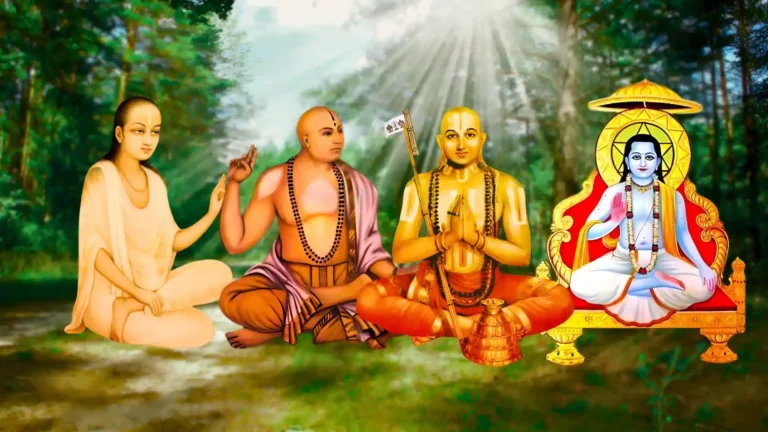Please Like the Blog and Share it for Maximum Reach
Table of Contents
Tripura Rahasya is a Practical Guide for Jnana
Today’s article is an exceptional discourse from the Trpiura Rahasya, a delightful rumination for intellectuals, treading the path of Jnana Yoga (knowledge).
The ability to think makes us humans, distinct from other species. Let us utilize this wonderful faculty of intelligence and delve into the most fundamental treatise, Tripura Rahasya.
The Tripura Rahasya is a practical guide which cuts our misconceptions one by one, untying our mental knots effortlessly.
Seeking Pleasure in Material Objects
The general question is: What is pleasurable and painful? The answer may seem obvious. Anything that is pleasant to the body and mind is pleasurable while vice versa is painful. Hence, we have come up with the general rule for happiness- Accept the pleasurable and discard the painful.
Spirituality doesn’t shun the idea of seeking materialistic pleasures. Rather, it offers an intelligent and logical perspective towards knowing what we truly want.
We spend our precious life and fortune pursuing an idea of happiness. We cross over thorny cacti, walk on scorching sand, but end up discovering a mirage! Are all our efforts worth it?
Our Happiness is Subjective
Let us keep an open minded approach and take up material objects to see if they can truly satisfy our thirst for eternal happiness. Take for instance the human body.
A man desires a woman’s body for bodily pleasure- Vice versa for a woman. But does the same sexual act produce happiness under all circumstances? When distressed or worried, the beloved’s embrace causes irritation or anger.
Take fire for example. Fire is agreeable in the winter season, but the same fire causes repulsion when ignited in the summers. Is our quest for happiness so subjective?
A man vies for family life and pins his happiness on that single desire. On the contrary, a man having a wonderful family remains worried all the time. So are children, family, and spouse, objects of happiness? Unless we introspect and answer ourselves these basic yet logical questions truthfully we can never escape the rigmarole of suffering.
The crux of our discussion is that our object of happiness should remain permanent and unchanged, under all circumstances- Certainly not like a chameleon that changes colors depending on time, place and circumstance. Our instinct is to invest our time, effort and energies only where we receive permanent benefits.
Our goal should be one, so that we can work towards achieving it. If goals keep changing, our happiness will also be subject to change.
Another short sighted approach towards happiness is fulfilling each desire as it springs up. We term ‘the relief experienced on dousing each craving’ as happiness. Harboring Desires is similar to injuring the body recklessly with sharp swords and then applying ointment on those wounds. Is that temporary relief what we call happiness?
If satisfying fleeting impulses (desire) answers the problem of happiness, even tiny insects must be happy- their desires are less-complex and easier to fulfill.
As each desire springs up, it leaves the latent seeds of pain- just as stepping on sand, leaves behind a footprint. Hence, it is clear from our discussion, no material object can satisfy man’s intrinsic standards for bliss.
7/8 Questions from Sanatana Dharma
The scores generated in this Quiz may or may not be absolute. There may be right or wrong answers to each Question. A percentage towards 100 indicates that you are more aligned to the overall subject matter.
What is Beautiful?
The idea of Beauty has fascinated man since time immemorial. There are many beauty trends that keep coming up. But, the question is what is truly beautiful? Well, there is no clear cut definition of beauty.
Beauty is just a mental concept. What appears beautiful to someone may appear ugly to somebody else.
Our preconceived/ preconditioned idea of beauty takes on a form which we term as beautiful or attractive. If someone is not in sync with our fantasized image, then that person appears less-attractive to us.
Based on previous impressions and Vasanas, man is accustomed to a particular form of whatever built, it can be fair-dark, tall-short, fat-thin, thick or scanty haired. When one mentally chews on that preconceived idea with consistent dedication, the very same idea solidifies and appears in person.
What happens then? On seeing that form, a spontaneous attraction springs up which we falsely call ‘love’. Know that man is not attracted to the other person, but to his own imagined idea built in his mind over the years. This mental picture can be different for different people.
That is why a self realized soul has transcended lust and attraction, because he has purged all mental imagery. His mind being cleansed, disconnected from all kinds of fantasy, he lives in the present, unagitated by even the fairest damsel on the planet. Know that, YOU are the source of desire.
Is Pleasure Person-dependent?
Pleasure is not limited to a particular kind or type of person.
Finally, it is all watered down to the intensity of emotion experienced by one. Dogs may experience greater pleasure than the most attractive couple on the planet. Due to attachment to a certain mental picture, a man may find his plain-looking spouse more delightful than a beauty queen.
Hence, the idea of beauty solely rests in the mind and has nothing to do with reality. If beauty lies in a specific object of love, then why don’t children feel the same attraction towards it just as they recognize sweetness in sugar?
As our scriptures proclaim, when one reaches the age of puberty, the Samskaras and Vasanas of previous lifetimes, come to the surface, drawing us towards people of certain physicalities, and emotional temperament. This picture of an ideal partner varies from person-person as it depends on one’s innate desires.
Depending on one’s strengths and vulnerabilities, one hunts for a partner who can fill gaps of their incomplete picture. For Example- An emotionally unstable man may find a strong and independent woman attractive.
On the other hand, the same woman may appear intimidating and less-appealing to a self made man. Again, these characteristics and behavior patterns come from our previous Janmas. The crux here is that no object is attractive or ugly, it all lies in our perception.
The Jnana Marga to Transcend Lust.
Well, unless we convince our logical mind that happiness does not lie in sex, it shall continue to pose obstacles and push one towards lustful activities.
The mind is like a curious but stubborn child. Until and unless it gets satisfactory answers it shall never stop. That is why the ancient rishis have taught Jnana Marga to intelligently confront the unsteady mind with logical arguments, putting the cork into its mouth for good.
As we discussed, one experiences lust due to continuous thinking about the opposite sex. What is it that causes lust? Is it the body? But we have already discussed that beauty doesn’t lie in the body, an object or a person, lust is a Vasana within.
Hence, Jnanis gives a factual but abhorrent description of the body parts humans deem desirable, some ready to forsake the greatest of riches, morality and social status. How can one find this body composed of hair, phlegm, bile, urine, and feces delightful, and that which continues to age moment-moment.
It is this description and fundamental question that led even the great Bhakti Saint Tulsidas Goswami to leave his family and walk in search of Sri Rama.
Thus, the hard hitting truths stated in the Tripura Rahasya can instill distaste towards material pleasures and develop a keen desire to know the Absolute Truth.
Please Like the Blog and Share it for Maximum Reach










